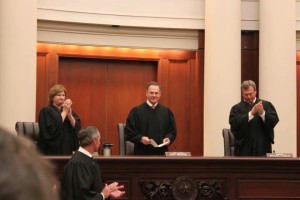 MONTGOMERY, Ala. — The Republican Party of Alabama has passed a resolution calling for changes to state law in relation to how it handles judges who have been accused of ethics violations in light of the recent suspension of Alabama Chief Justice Roy Moore.
MONTGOMERY, Ala. — The Republican Party of Alabama has passed a resolution calling for changes to state law in relation to how it handles judges who have been accused of ethics violations in light of the recent suspension of Alabama Chief Justice Roy Moore.
The Alabama Republican State Executive Committee says that state law requiring the automatic suspension of accused judges “is an arbitrary and unwarranted punitive measure” because it lacks due process.
“Judges may be subject to false charges by unethical individuals and organizations who are not seeking justice, but seek to cause them unwarranted harm,” the passed resolution, presented by local pastor James Henderson, reads in part.
“[T]he Alabama State Judicial Inquiry Commission (JIC) has the legal duty to objectively and fairly function in a manner similar to a grand jury in investigating allegations of ethics violations brought against state judges and recommending trial by the Court of the Judiciary when warranted,” it says.
The Alabama GOP also requests the state enact a law requiring that members of the JIC be elected by the people instead of appointed by state leaders.
“[T]he Alabama State Judicial Inquiry Commission has the duty to adhere to the law and to be accountable to the citizens of Alabama in the proper performance of their duties,” the resolution states. “[T]he voters of Alabama have long established by law that the election of state officials by the voters is preferred over their appointment, in order to assure their accountability.”
“The current situation allows the JIC too much power and the ability to punish judges without due process,” Mat Staver of Liberty Counsel, which is representing Moore, said in a statement supporting the resolution. “Chief Justice Roy Moore should have never been suspended from his bench from these baseless charges.”
“The JIC has become an arm of the Southern Poverty Law Center and other politically-motivated groups. The JIC is not supposed to be politically biased but it has become so. The JIC needs to be reigned in,” he stated.
As previously reported, Moore was suspended from the bench in May and now faces possible removal after the homosexual advocacy groups Southern Poverty Law Center, People for the American Way, the Human Rights Campaign, and a drag queen who goes by the name Ambrosia Starling, pressed the JIC to take action against Moore.
The situation began in 2013 when two lesbians in the state sued Gov. Robert Bentley, Attorney General Luther Strange and Mobile County Probate Judge Don Davis—among others—in an attempt to overturn Alabama’s marriage amendment after one of the women was denied from adopting the other woman’s child.
In January 2015, U.S. District Judge Ginny Granade ruled in favor of the women, prompting Moore to send a memo to probate judges throughout the state, advising that they are not required to issue “marriage” licenses to same-sex couples as he believed that Grenade’s ruling only applied to the two women.
Moore also wrote a letter to Gov. Robert Bentley, urging him to “uphold and support the Alabama Constitution with respect to marriage, both for the welfare of this state and for our posterity.”
“Be advised that I will stand with you to stop judicial tyranny and any unlawful opinions issued without constitutional authority,” he stated.
The Southern Poverty Law Center (SPLC) then filed a judicial ethics complaint against Moore over his letter to Gov. Bentley, and the homosexual activist group Human Rights Campaign (HRC) submitted 28,000 petition signatures to the JIC calling for Moore’s removal.
As confusion ensued over Moore’s letter to probate judges, one judge, John Enslen of Elmore County, asked the full Alabama Supreme Court for further guidance. In March 2015, six of the nine judges of the Alabama Supreme Court released a historic order halting the issuance of same-sex “marriage” licenses in the state. Moore recused himself from the matter and was not included in the order.
“As it has done for approximately two centuries, Alabama law allows for ‘marriage’ between only one man and one woman,” the 148-page order read. “Alabama probate judges have a ministerial duty not to issue any marriage license contrary to this law. Nothing in the United States Constitution alters or overrides this duty.”
In January, Moore sent another letter advising that the full court’s would remain in effect until it issued directives in light of the U.S. Supreme Court ruling in Obergefell v. Hodges.
“Until further decision by the Alabama Supreme Court, the existing orders of the Alabama Supreme Court that Alabama probate judges have a ministerial duty not to issue any marriage license contrary to the Alabama Sanctity of Marriage Amendment or the Alabama Marriage Protection Act remain in full force and effect,” he wrote on Jan. 6.
He also noted that his order does not weigh in on how June’s U.S. Supreme Court ruling has impact on the Alabama Supreme Court’s directive, and said that it was not his place to make that determination.
“I am not at liberty to provide any guidance to Alabama probate judges on the effect of Obergefell on the existing orders of the Alabama Supreme Court. That issue remains before the entire court, which continues to deliberate on the matter,” Moore wrote.
In May, the Alabama Judicial Inquiry Commission (JIC) announced that it had filed ethics charges against Moore, and suspended the chief justice while he faces a trial before the Alabama Court of the Judiciary, which is scheduled for Sept. 28.
Become a Christian News Network Supporter...


